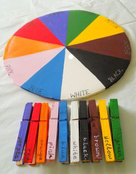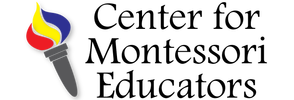Early Childhood (ages 2½ through 6)

DESCRIPTION
This Course prepares individuals to teach children 2 1/2 through 6 years of age in a period of 24 weeks of lecture hours and 24 weeks of externship/internship. It consists of two units, Unit A: Pedagogical Theory and Unit B: Externship/Internship, starting the first week of January and ending the last week of June or starting the first week of August and ending last week of January. Both units of the Course need to be completed in no more than one year to qualify for the certificate of completion. The Educational level of this course is that of undergraduate, post-secondary or continuing education.
CURRICULUM
The Early Childhood Course consists of 200 Lecture hours and 1000 Supervised Externship hours. Total hours 1200
Note: Lecture Hours and Supervised Practicum imply the presence of an instructor. The Early Childhood Course curriculum comprises a variety of activities which are pertinent to the development of children 2 1/2 through 6 years of age. The lecture-demonstrations apply to the following areas of study:
OBJECTIVES
The objective of the Early Childhood Course is to prepare students for a career in Montessori teaching within the specified child age range of 2 1/2 through 6 years. In order to meet these objectives, students will gain knowledge in the areas of Montessori philosophy and psychology, purposes, materials, presentation of lessons, verbalization skills and principle and techniques that prepare the student to manage a class successfully. Upon completing this program, the Early Childhood Lead Guide shall be able to:
Demonstrate knowledge of human development and education:
Demonstrate knowledge, application, and analysis of the theoretical / philosophy call base upon which Montessori early childhood education programs have been and currently are being developed.
Plan programs that meet the individual needs and interests of children appropriate to their development, social cultural background, and experience level to:
Evaluate objectives, children’s individual growth, learning, and programs:
Designed and evaluate curriculum materials and resources appropriate to children varying with abilities and cultural backgrounds.
Demonstrate interest and involvement in the community served.
Demonstrate program leadership:
This Course prepares individuals to teach children 2 1/2 through 6 years of age in a period of 24 weeks of lecture hours and 24 weeks of externship/internship. It consists of two units, Unit A: Pedagogical Theory and Unit B: Externship/Internship, starting the first week of January and ending the last week of June or starting the first week of August and ending last week of January. Both units of the Course need to be completed in no more than one year to qualify for the certificate of completion. The Educational level of this course is that of undergraduate, post-secondary or continuing education.
- UNIT A – PEDAGOGICAL THEORY - This part of the Course consists of lecture demonstrations weekly. The Montessori materials and curriculum exercises are presented in a step-by-step, sequential order of demonstrations according to the academic subjects covered in the course. This is a period of 24 weeks for either first or second semester in the year.
- UNIT B – EXTERNSHIP/INTERNSHIP - To acquire total understanding and first-hand experience of the Montessori Method, the student-teacher is required to spend a minimum of 1000 hours in externship/internship. During these hours, the student-teacher will be asked to aid the functioning of the classroom as an assistant teacher would, thus gaining an invaluable practical experience in classroom management. Staff meetings for class-management instruction are a mandatory part of the student’s externship/internship. Please note that the Pedagogical Theory / Lectures take a period of six months. The student-teacher has another five months to comply with supervise practicum hours.
CURRICULUM
The Early Childhood Course consists of 200 Lecture hours and 1000 Supervised Externship hours. Total hours 1200
Note: Lecture Hours and Supervised Practicum imply the presence of an instructor. The Early Childhood Course curriculum comprises a variety of activities which are pertinent to the development of children 2 1/2 through 6 years of age. The lecture-demonstrations apply to the following areas of study:
- LANGUAGE (PRE 101) - Sensorial materials for the development of writing and reading in a natural way. Lecture, 30 hours; Lab, 115 hours; Externship, 28 hours.
- MATH (PRE 102) - Materials designed to represent mathematical concepts in concrete form, suitable for early education through stimulus and manipulation. Lecture, 30 hours; Lab, 110 hours; Externship, 23 hours.
- SENSORIAL DEVELOPMENT (PRE 103) - Series of materials designed to stress the importance of educating the senses, sharpening the child’s ability to discriminate color, size, shape, texture, weight, sound, etc., as well as the knowledge, name and form of all plane figures. Lecture, 37 hours; Lab, 110 hours; Externship, 18 hours.
- CULTURAL SUBJECTS (PRE 104) - Materials that offer many opportunities for children to enlarge their knowledge by spontaneous exposure to Geography, Botany, Zoology and Science. Lecture, 30 hours; Lab, 110 hours; Externship, 34 hours.
- PRACTICAL LIFE (PRE 105) - Exercises set up for the child to develop self-confidence, independence, good working habits, coordination, attention span and concentration. Lecture, 30 hours; Lab, 110 hours; Externship, 16 hours.
- CLASSROOM MANAGEMENT (PRE 106) - Pedagogical Principles and Classroom Management Techniques as well as verbalization skills needed to obtain a class environment conducive to learning and self-discipline. Lecture, 30 hours; Lab, 110 hours; Externship, 10 hours.
- MONTESSORI PSYCHOLOGY AND PHILOSOPHY (PRE 107) - This course is designed to provide an intensive practical and comprehensive study of Dr. Maria Montessori’s method of education. It also includes the study of the different stages of development and the child’s psychological characteristics from ages birth to 12 years of age. Lecture, 19 hours; Lab, 110 hours; Externship, 9 hours.
- ARTISTIC EDUCATION (PRE 108) - This includes activities that relate to singing, playing the musical bells and tone bars, as well as the different techniques for arts and crafts. Lecture, 30 hours; Lab, 110 hours; Externship, 10 hours.
OBJECTIVES
The objective of the Early Childhood Course is to prepare students for a career in Montessori teaching within the specified child age range of 2 1/2 through 6 years. In order to meet these objectives, students will gain knowledge in the areas of Montessori philosophy and psychology, purposes, materials, presentation of lessons, verbalization skills and principle and techniques that prepare the student to manage a class successfully. Upon completing this program, the Early Childhood Lead Guide shall be able to:
Demonstrate knowledge of human development and education:
- Interpret child development and early education concepts to other staff, parents, and community.
- Plan for continuity of learning experiences for children in the age range of certification.
Demonstrate knowledge, application, and analysis of the theoretical / philosophy call base upon which Montessori early childhood education programs have been and currently are being developed.
Plan programs that meet the individual needs and interests of children appropriate to their development, social cultural background, and experience level to:
- Demonstrate ability to assess children’s developmental needs through a variety of vehicles (i.e., observation, case studies, tests, developmental scales, classroom products).
- Provide a suitable match between assessment and developmental activities.
- Demonstrate ability to support sensory-motor development.
- Demonstrate ability to support language arts development.
- Demonstrate ability to support mathematics development.
- Demonstrate ability to support the development of art, music, movement, geography, and science.
- Demonstrate knowledge of varied learning styles.
- Demonstrate knowledge of environmental design and preparation.
- Provide opportunities for choice, problem-solving, decision-making, and responsibility for learning on the part of the children.
- Demonstrate a broad repertoire of teaching strategies (i.e., structuring environment; demonstration, and concrete models, modeling behavior, using verbal strategies such as inquiry, explanation, imitation, illustration, and dramatization).
- Demonstrate ability to plan and implement group activities.
- Develop organizational and management procedures to facilitate growth and learning.
Evaluate objectives, children’s individual growth, learning, and programs:
- Demonstrate consistency between stated objectives and methods of evaluation (i.e., assessment of cognitive, affective, and psychomotor development).
- Demonstrate the knowledge of age-appropriate evaluative measures.
- Develop and use a variety of appropriate record-keeping and evaluation processes.
- Interpret results of evaluative measures.
- Prepare professional reports.
Designed and evaluate curriculum materials and resources appropriate to children varying with abilities and cultural backgrounds.
- Evaluate and select prepared curriculum materials.
- Develop original materials to meet the needs and interests of children.
- Demonstrate knowledge of the rationale of curriculum materials.
- Develop knowledge of continuum with curriculum materials.
Demonstrate interest and involvement in the community served.
- Demonstrate knowledge of community served.
- Demonstrate ability to articulate program.
- Demonstrate ability to participate in parent conferences and skill in non-judgmental listening and interactions with others.
- Develop awareness of community resources for referral, enrichment, program development and implementation.
Demonstrate program leadership:
- Implement minimum standards required by health/education/welfare codes.
- Organize schedules, supplies, maintenance of equipment, budget planning.
- Coordinate classroom operation and personnel.
